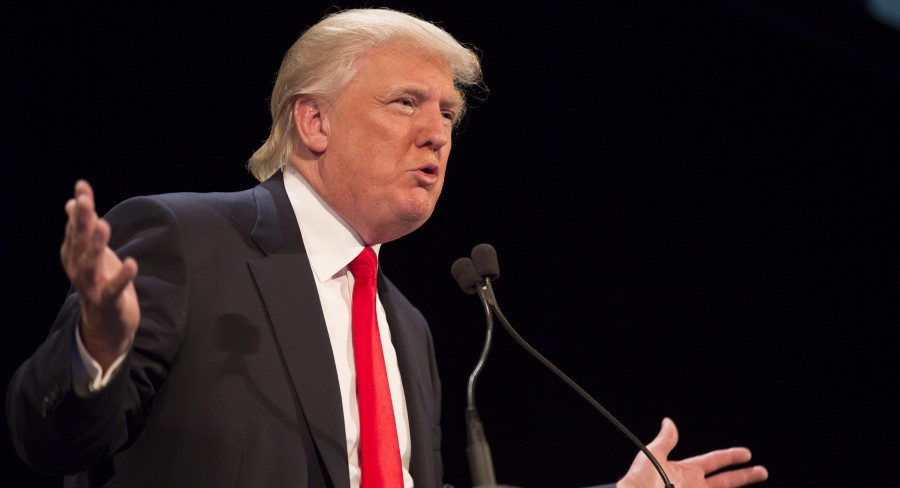‘Trump-ification’ taking over 2016 campaign
Donald Trump speaks during the family leadership summit in Ames, Iowa Saturday Aug. 10, 2013. Republican presidential hopefuls are hoping to impress conservative voters at the conference organized by an influential Christian group. The daylong event will be one of many candidate cattle calls in the grueling run-up to the 2016 presidential election. None of the potential contenders appearing Saturday has declared candidacy. Conservative voters could be key to a 2016 victory in Iowa’s caucuses, the nation’s first presidential nominating event. (AP Photo/Justin Hayworth)
September 29, 2015
Sporting a red baseball cap throughout his campaign trail, TV personality, real estate billionaire, and presidential candidate Donald Trump checks two items off his “to-do” list. One of which is to make his campaign slogan, “Make America Great Again,” known. The other is to restrain his infamous hair from taking flight during a speech.
Since his candidacy announcement in June of 2015, media outlets of all political loyalties have exhausted their air times with constant reports of everything and anything Trump-related. Why? Because rather than spewing the same, convoluted diction associated with government, Trump speaks to the American people in a language they themselves use: frustration with the nothingness that elected officials produce.
The 2016 Presidential Campaign has undergone what the Washington Press has deemed a: “Trump-ification”. This obsession is a result of a direct relationship: television is fueled by ratings; Trump attracts viewership; therefore, the transmission of Trump’s tan will continue to reach Americans’ televisions so long as he keeps things interesting.
Perhaps it would be more accurate to state, “if he keeps things about himself.” His controversial speeches revolve around his personal grudges and uncensored opinions regarding his running mates and most notably, journalists. His stand-up approach and refusal to be politically correct can be surmised in the recollection of the television event of the summer, the first GOP debate.
According to the Texas GOP vote.com, Fox News set a record for its largest debate audience: over 24 million viewers. And like any delectable reality TV show, it had the cat-fighting. The only aspect of ‘Drama with Donald’ unlike a reality TV show was that nobody was voted off the stage.
Debate moderators Megyn Kelly, Chris Wallace, and Brett Braier’s fierce questions exposed viewers to the deficiencies in Trump’s political knowledge, and his character. Testing Trump’s temperament, they questioned his loyalty to the Republican party, his contentious business history, and his slandering of women. Trump’s blunderous and factless responses strayed from the subject and opened new avenues of ambiguity regarding the larger-than-life symbol for change.
Senior Kathy Ruiz commented on Trump’s offensive attitude: “I think that he’s very inconsiderate. Whether it be his views on immigrants, or his views on women. Trump lacks any empathy and I think that’s a crucial trait that a president should have.”
Trump’s following attack on Kelly via Twitter spurred a war on Fox News, the one, reliable Republican station that could make or break his political career. His strategy represents Trump’s inability to filter his personal grievances from political matters. In addition to picking a fight with a popular TV anchor, Trump has ridiculed war hero Sen. John McCain’s prisoner-of-war history, insulted the Mexican community, and failed a foreign policy ‘pop quiz’ this summer.
Yet, according to realclearpolitics.com, as of Sept. 7, Labor Day – the unofficial commencement of serious presidential campaigning – Trump holds 27.8% of the Republican Presidential Nomination polls as compared to runner-up neurosurgeon Ben Carson with 13.5%.
Both Republican politicians and day-to-day Americans who are frustrated with present government leadership support Trump. In essence, Trump serves as a tool to inflict wounds onto politicians that supposedly require a reality-check. And who is not more qualified to instill a refreshing breeze of that reality than vociferous Trump? Trump embodies the anger Americans hold against Washington.
He also strives to emulate the conservative beliefs of many Americans, which can be seen in his practice of paranoia politics: his extreme immigration plans appeals to nativist fears. The simplistic approach of an impenetrable wall that borders Mexico represents his optimistic campaign platform that strives to attain his ‘ideal’ nation of the past. However, his abrasive attitude regarding the subject of immigration has repulsed many Mexican-Americans, inciting protest wherever his road to Washington leads him.
Interestingly, Trump attracts conservatives as much as he captivates diverse crowds; this is due to his ruthless hunger for power that young professionals can admire.
Regardless of his unconventional political measures, this politician has an enduring charm that currently entrances the nation’s polls. Whether one loathes or loves Trump, his large personality and straightforward, sometimes incoherent, speech gives the opportunity for all Americans to listen to what he has to say.
American government teacher Joseph Wejman says, “I think teens find him intriguing because of his honesty . . .[and how] blunt he can be. I think some adults like that too. He doesn’t give polished, clean-cut answers. His views are controversial and they bring an element of suspense. However, you wonder how long this [Trump’s popularity] will last. It has brought a lot of intrigue to the election. But once the debates happen more frequently and the money piles in for the established candidates, I think Trump’s ideas will be labeled as too extreme; the American people will put more thought into the election and do more to get behind the more established candidates.”
Whether the “Trump-ification” phenomenon intensifies or diminishes is up to the American public. Not every voter may be a billionaire; yet, those who exercise their right to vote, including the Nazareth Academy senior class of 2016, hold the power to say two words to Trump, who, on his own reality television show ‘The Apprentice’ has famously repeated to so many Americans:
“You’re fired.”
Ironic, isn’t it?

